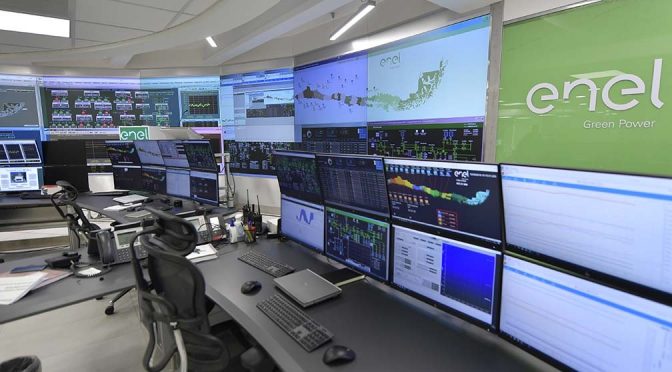The reorganization of teams and shifts, the creation of backup rooms, and remote control. These are the solutions implemented by Enel Green Power to face this emergency situation and to continue to manage all production units remotely.
The seeds of the past bear fruit in the present. Our journey of constant innovation and the digital solutions we’ve developed over the years, both infrastructural, with the Cloud, and with equipment for our personnel (smartphones and laptops to work from home), are now enabling us to manage the COVID-19 crisis better and optimize the role of control rooms: the mega computers that allow us to balance flows between electrical grid demand and the availability of renewable source supply, with benefits for the stability of the grid itself and for customers.
In addition to safety measures for the health of our colleagues and collaborators, Enel Green Power has enhanced its control rooms, duplicating shift lines, providing backup rooms, even in homes, and using all the devices available for remote control and
implementing comprehensive solutions to guarantee absolute and effective protection against any cyber attacks.
The measures we’ve implemented in the Control Rooms of our renewable plants around the world have allowed EGP to manage all our production units, as well as electrical substations, remotely 24 hours a day, 7 days a week.
Backup Control Rooms at Home
In Italy, the number of plants (more than 500) and connected infrastructure (dams, channels, tunnels) make remote operation especially critical. This is carried out by five Control Rooms, in different areas of the country. The operation of each control room has been doubled, with a main control room and a backup one. Here, to face the emergency, shifts have been reorganized and teams in both the main and backup control room have been doubled. Secure remote access systems have been provided to work from home.
“The sharp reduction of electrical energy demand and the difficulty of predicting it caused to the coronavirus emergency has led to an increase in reserve supply and grid regulation services. We are trying to respond to these challenges by pressing on the flexibility of our hydro fleet, even in its new state of functioning, affected by the emergency.”
– Giovanni Topo, Head of Dispatching Centers & Water Planning, EGP Italy
In Spain, where the central wind-solar control room in Madrid was duplicated with a backup room in Santiago de Compostela, the same protocols have been put in place.
“The unprecedented situation we are living through has forced us to implement extraordinary solutions, like the duplication of Control Rooms, to mitigate the impact of Coronavirus on our activities. In this way, we can guarantee system stability and manage the 119 wind and solar plants in Spain, as well as the related 100 electrical substations, maintaining the highest efficiency standards.”
– Belén Herrero Lorente, Head of Wind, Solar and Biomass Control Room, EGP Iberia
In Greece, we’ve ensured remote control and created backup control rooms in homes. This has already been applied in other emergency situations and is being replicated successfully in the time of COVID-19.
“This emergency is happening during a transition phase for our control rooms. The backup systems we had created have allowed us to transfer these activities to the homes of our workers, creating independent control centers. Our colleagues are working with increased effort, strengthening communications with technical teams from Operations & Maintenance, in order to guarantee an essential service to the community. I’m pleased to say that their efforts have made us more prepared to face such a critical moment today.”
– Taschounidis Timotheos, Head of Control Room, EGP Greece
A Constant Exchange of Information to Guarantee Excellent Service
Across the ocean, in North America, Enel Green Power’s control room activitiescarry on. For example, through the Fallon Control Room in the state of Nevada, we continue to manage three geothermal plants and two solar farms, including the innovative Cove Fort geothermal plant in Sulphurdale, Utah, which is the world’s first large scale power generation facility to successfully combine geothermal with hydropower technology.
At the Stillwater plant control room, operators have adopted enhanced safety practices including the reorganization of personnel, social distancing, daily disinfection of shared spaces, flexible scheduling to limit staff presence, among other actions to contain the spread of COVID-19 while guaranteeing the continuity of energy production.
“Despite the stresses presented by the current situation, the Stillwater Control Room has risen to the challenges. Control room operators are demonstrating stalwart commitment to safety and power generation, maintaining uninterrupted communication with site leadership via our remote communications tools.”
– Jon Hauptfuhrer, Control Room Operations Manager, Nevada – Enel Green Power North America
At the Andover Control Room, in Massachusetts, the communication between control room and field teams has remained consistent, thanks to the digital tools implemented prior the pandemic such as laptops with virtual machines and remote connection software. Team members receive daily feedback from operators on shift to ensure any changes to workload are accounted for, maintaining the highest quality standards.
“The Operators have shown determination in these difficult times, especially considering that they need to complete their jobs with the same excellence despite having a different type of on-site support.”
– Chris Corr, Control Room Operations Manager, Massachusetts, Enel Green Power North America
A positive example of this is the Control Room in Chile, the only one able to monitor all four technologies at once, thanks to the most cutting-edge automation technologies and communication and data visualization systems. Since its inauguration, the room has been able to guarantee and support the production of renewable energy throughout the country at every moment, 24 hours a day, 365 days a year.
In this health emergency, we are again demonstrating outstanding resilience, which allows us to adapt and react successfully to the challenges that arise along our way, ensuring the production of the sustainable energy that communities need, now more than ever.

